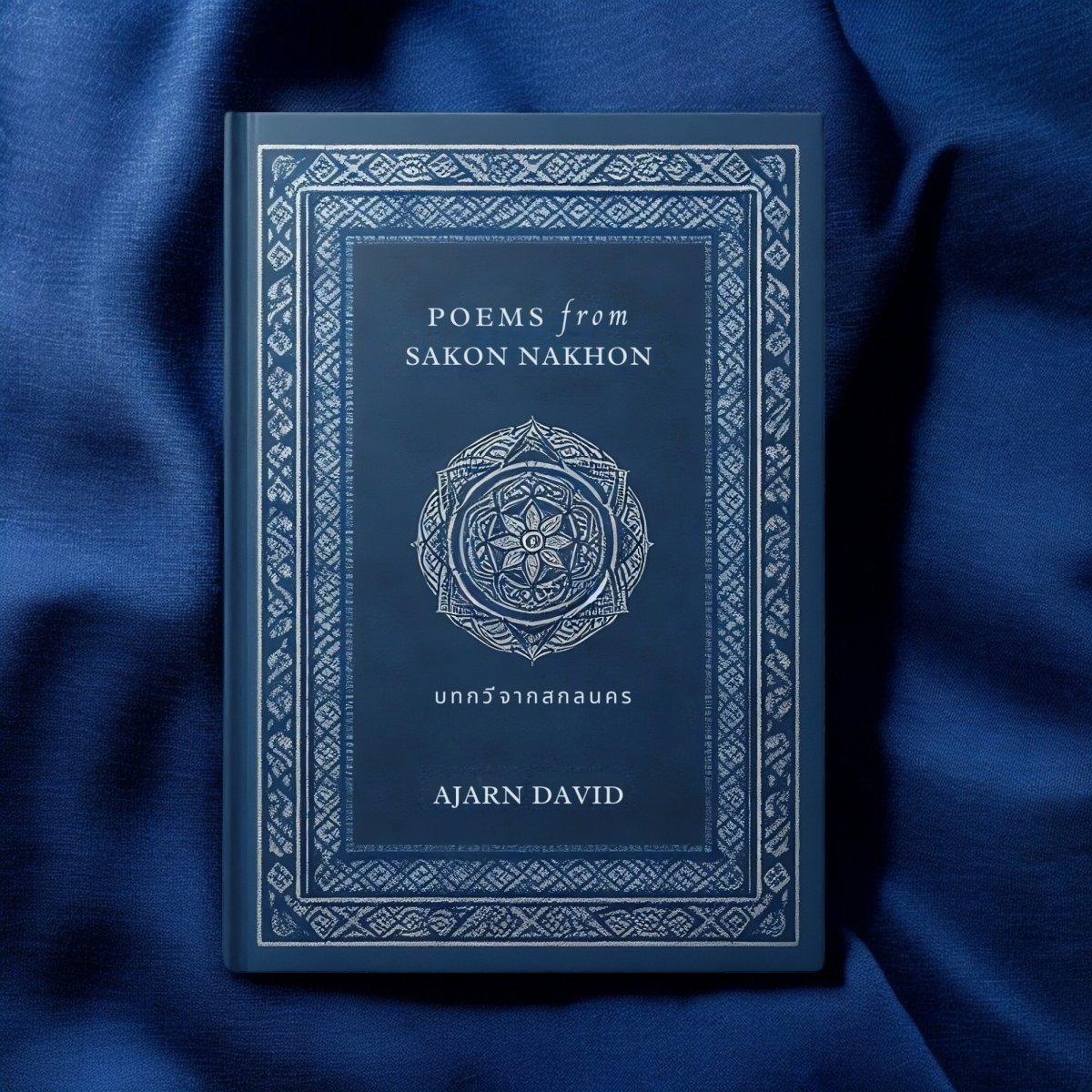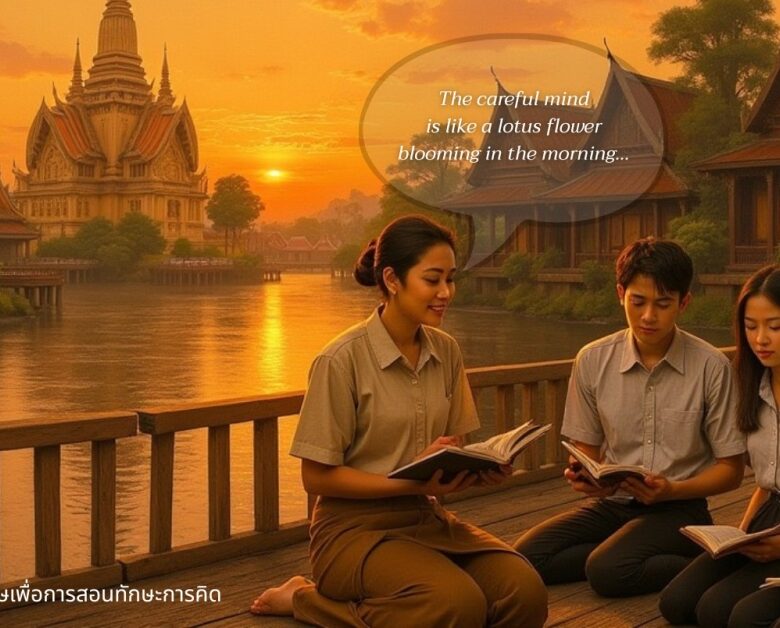"For readers searching for love poetry that is both deeply Thai and universally resonant, Poems from Sakon Nakhon offers a rare and beautifully crafted experience. "
Love and Longing in Thai Poetry
T
hai poetry has long been shaped by strict metrical patterns and rich imagery, particularly in love poetry. Classic Thai poets such as Sunthorn Phu and King Rama II crafted verses filled with longing, devotion, and the deep pain of separation.
Traditionally, love poems in Thailand are framed within natural metaphors— blooming lotus flowers, the changing tides, or the quiet ache of a monsoon’s arrival — capturing the bittersweet nature of romance.
Ajarn David’s "Poems from Sakon Nakhon" (written in English and Thai) offers a modern take on Thai love poetry, breaking away from rigid structures to embrace free verse. This stylistic shift allows for a more direct and intimate exploration of love — one that feels raw, heartfelt, and deeply personal.
What makes the Thai versions especially compelling is their ability to retain both the emotional depth of the original English poems and the beauty of the Thai language, all while avoiding the overly formal phrasing often found in classical Thai poetry.
Love as Devotion: The Promise to Stay
O
ne of the most moving love poems in the collection expresses unwavering commitment, with the speaker vowing to remain by their beloved’s side despite time, distance, or even death. The Thai translation captures this sense of eternal devotion with flowing, rhythmic lines that emphasize permanence (ชั่วนิรันดร์ — "forever").
Unlike Western love poetry, which often dwells on passion and intensity, this poem aligns with traditional Thai views of love as enduring, patient, and deeply respectful. The Thai language lends itself well to this sentiment, with words like ห่วงใย (concern, care) carrying a weight of tenderness that makes the promise feel even more profound.
Love Poems and Emotional Surrender
A
particularly striking poem explores the Thai word wai-jai (ไว้ใจ) which means to entrust one’s heart to another. In Thai culture, this phrase carries far more meaning than simply “trusting” someone — it implies complete emotional surrender, an act of giving oneself fully to a relationship.
The Thai translation of this poem skillfully conveys this depth, using phrases like มอบหัวใจให้เก็บรักษา (“to entrust the heart for safekeeping”) and ช่วยค้ำจุนปกป้องจากผองภัยนานา (“to protect it from harm”).
Unlike Western concepts of love, which often highlight independence even within relationships, Thai love is rooted in interdependence — the idea that true love involves mutual care and responsibility.
A Poem About Falling in Love
I n one of the more humorous yet insightful love poems, Ajarn David compares the Western phrase “falling in love” to the Thai phrase dtok loom ruk (ตกหลุมรัก), which literally means “falling into the pit of love”.
The Thai version of this poem enhances its wit by describing the experience as a sudden plunge, a feeling of helplessness that mirrors the physical sensation of falling. This linguistic playfulness highlights the difference between Western and Thai views of romance.
While English expressions of love often suggest a gradual process, Thai metaphors frequently depict love as something inescapable, overwhelming, and even dangerous — much like stepping into an unseen hole.
The Sound of a Broken Thai Heart
T
hai poetry has always been unafraid to explore the pain of love, and "Poems from Sakon Nakhon" continues this tradition with poems that examine heartbreak and loss. One poem in the book focuses on the Thai phrase ohk hahk (อกหัก), meaning “broken heart”.
In Thai, ohk hahk has a harsh, almost violent sound, reinforcing the deep emotional impact of lost love. The Thai translation of the poem mirrors this intensity, using sharp, direct phrasing that makes the reader feel the sting of a heart shattering.
Unlike English, where a broken heart is often described metaphorically (as something fragile that cracks or fades), the Thai expression implies a sudden, irreversible break — one that is deeply felt in the body and soul.
Cultural Nuances in Thai Love Poetry
A
particularly intriguing love poem by Ajarn David contrasts the Western kiss with the Thai hawm (หอม), a gentle kiss on the cheek that is both affectionate and respectful.
The poem captures this cultural distinction beautifully, describing the hawm as something cherished and sought after, while the more Western-style kiss is portrayed as hit-or-miss in Thai society.
This poem highlights a fundamental difference in how love and intimacy are expressed in Thai culture. While Western romance often emphasizes grand gestures, Thai expressions of love are frequently more subtle — conveyed through small actions, gestures of care, and a deep sense of mutual respect.
Why This Thai Love Poetry is Unique
T
he Thai love poetry in Poems from Sakon Nakhon is only a part of the book, with other poems dealing with Thai culture, Buddhism, and the daily lives of the Isaan people. The book is a unique collection for the following reasons.
A Modern, Free-Verse Style – The Thai translations move away from classical metrical constraints, making the poetry feel more natural and immediate.
Emotional and Cultural Depth – The poems retain their Thai identity, using words and expressions that reflect the unique ways love is understood in Thai culture.
A Balance Between Playfulness and Devotion – From the humorous exploration of dtok loom ruk to the deeply moving promises of eternal love, the collection offers a full spectrum of romantic experience.
Bilingual Presentation – Seeing the same poem in both Thai and English allows readers to appreciate the nuances of language and cultural differences in expressing love.
For readers searching for Thai love poems that are both deeply Thai and universally resonant, "Poems from Sakon Nakhon" offers a rare and beautifully crafted experience.
The Thai translations do more than simply mirror the English originals — they breathe new life into the poems, using the richness of the Thai language to enhance their emotional impact.
Whether capturing the devotion of lifelong love, the intensity of heartbreak, or the quiet beauty of affectionate gestures, these poems remind us that love, in all its forms, transcends language and culture.






